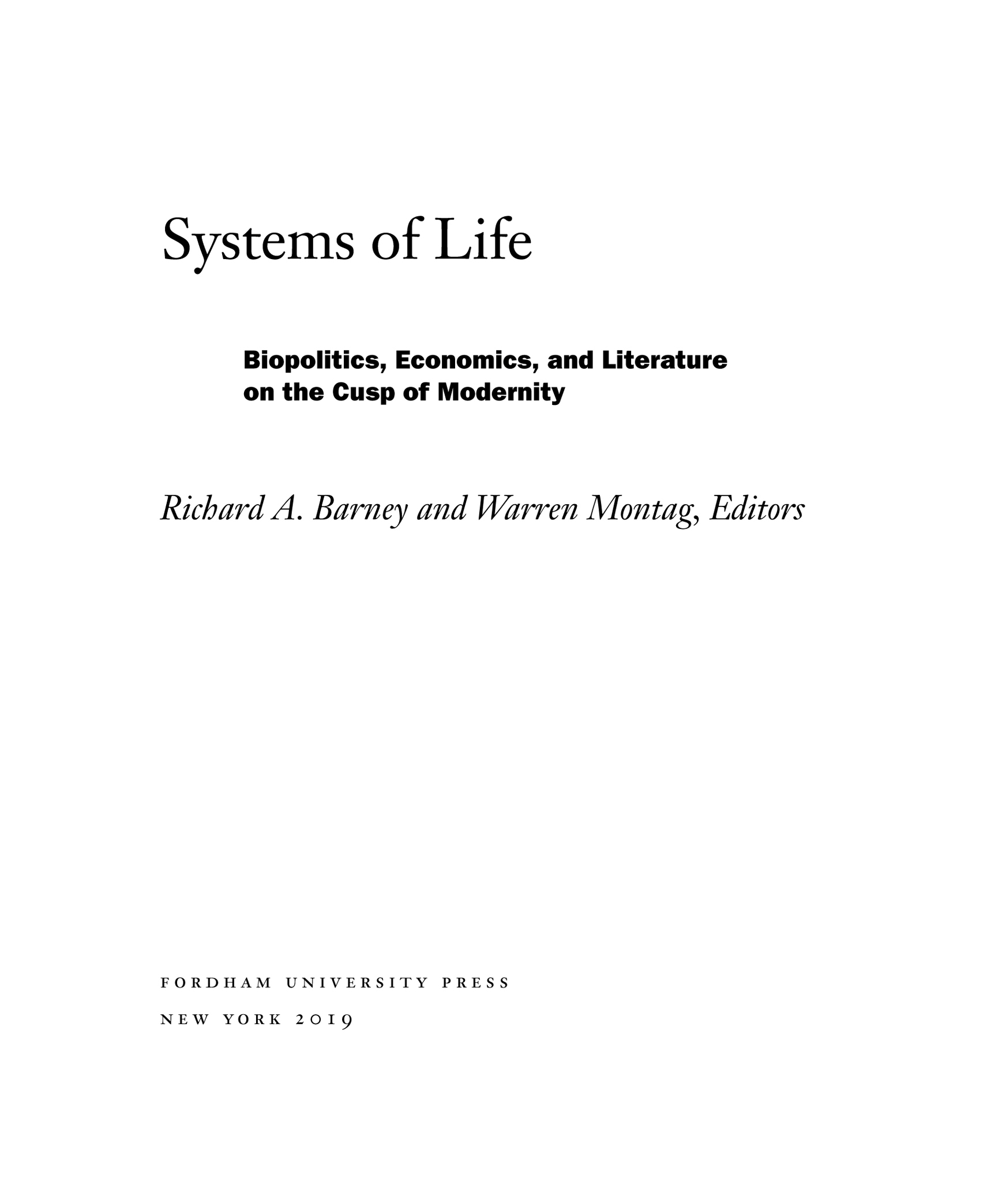Richard A. Barney - Systems of Life: Biopolitics, Economics, and Literature on the Cusp of Modernity
Here you can read online Richard A. Barney - Systems of Life: Biopolitics, Economics, and Literature on the Cusp of Modernity full text of the book (entire story) in english for free. Download pdf and epub, get meaning, cover and reviews about this ebook. year: 2019, publisher: Fordham UP, genre: Politics. Description of the work, (preface) as well as reviews are available. Best literature library LitArk.com created for fans of good reading and offers a wide selection of genres:
Romance novel
Science fiction
Adventure
Detective
Science
History
Home and family
Prose
Art
Politics
Computer
Non-fiction
Religion
Business
Children
Humor
Choose a favorite category and find really read worthwhile books. Enjoy immersion in the world of imagination, feel the emotions of the characters or learn something new for yourself, make an fascinating discovery.

- Book:Systems of Life: Biopolitics, Economics, and Literature on the Cusp of Modernity
- Author:
- Publisher:Fordham UP
- Genre:
- Year:2019
- Rating:3 / 5
- Favourites:Add to favourites
- Your mark:
- 60
- 1
- 2
- 3
- 4
- 5
Systems of Life: Biopolitics, Economics, and Literature on the Cusp of Modernity: summary, description and annotation
We offer to read an annotation, description, summary or preface (depends on what the author of the book "Systems of Life: Biopolitics, Economics, and Literature on the Cusp of Modernity" wrote himself). If you haven't found the necessary information about the book — write in the comments, we will try to find it.
Richard A. Barney: author's other books
Who wrote Systems of Life: Biopolitics, Economics, and Literature on the Cusp of Modernity? Find out the surname, the name of the author of the book and a list of all author's works by series.
Systems of Life: Biopolitics, Economics, and Literature on the Cusp of Modernity — read online for free the complete book (whole text) full work
Below is the text of the book, divided by pages. System saving the place of the last page read, allows you to conveniently read the book "Systems of Life: Biopolitics, Economics, and Literature on the Cusp of Modernity" online for free, without having to search again every time where you left off. Put a bookmark, and you can go to the page where you finished reading at any time.
Font size:
Interval:
Bookmark:
Systems of Life
 Stefanos Geroulanos and Todd Meyers, series editors
Stefanos Geroulanos and Todd Meyers, series editors

Copyright 2019 Fordham University Press
All rights reserved. No part of this publication may be reproduced, stored in a retrieval system, or transmitted in any form or by any meanselectronic, mechanical, photocopy, recording, or any otherexcept for brief quotations in printed reviews, without the prior permission of the publisher.
Fordham University Press has no responsibility for the persistence or accuracy of URLs for external or third-party Internet websites referred to in this publication and does not guarantee that any content on such websites is, or will remain, accurate or appropriate.
Fordham University Press also publishes its books in a variety of electronic formats. Some content that appears in print may not be available in electronic books.
Visit us online at www.fordhampress.com.
Library of Congress Cataloging-in-Publication Data
Names: Barney, Richard A., (date) editor. | Montag, Warren, editor.
Title: Systems of life : biopolitics, economics, and literature on the cusp of modernity / Richard A. Barney and Warren Montag, editors.
Description: First edition. | New York : Fordham University Press, 2019. | Series: Forms of living | Includes bibliographical references and index.
Identifiers: LCCN 2018020389| ISBN 9780823281725 (cloth : alk. paper) | ISBN 9780823281718 (pbk. : alk. paper)
Subjects: LCSH: BiopoliticsEuropeHistory. | EconomicsEuropePhilosophyHistory. | European literature18th century. | European literature19th century.
Classification: LCC JA80 .S97 2019 | DDC 320.01dc23
LC record available at https://lccn.loc.gov/2018020389
Printed in the United States of America
21 20 195 4 3 2 1
First edition
CONTENTS
Richard A. Barney and Warren Montag
Christian Marouby
James Edward Ford III
Pierre Macherey
Catherine Packham
Richard A. Barney
Annika Mann
Amanda Jo Goldstein
Mrinalini Chakravorty
Timothy C. Campbell
Systems of Life
Richard A. Barney and Warren Montag
The best way to learn any Science, is to begin with a regular System, or a short and plain Scheme of that Science, well drawn up into a narrow Compass.
ISAAC WATTS, The Improvement of the Mind (1741)
That the fitness of any system or machine to produce the end for which it was intended, bestows a certain propriety and beauty upon the whole, and renders the very thought and contemplation of it agreeable, is so very obvious that nobody has overlooked it.
ADAM SMITH, The Theory of Moral Sentiments (1759)
In the eighteen years between Isaac Wattss and Adam Smiths remarks regarding the utility of systematic thinking at the middle of the eighteenth century, we find a conceptual arcin miniaturethat fits the broader development of European thinking about system from the early eighteenth century to the early nineteenth. Both authors stress the attractions of systematic efficiency and coherence, for instance, but whereas Watts focuses his appreciation on the relatively narrow compass of the epistemological benefits for knowledge formation (where science could designate any field of developed expertise), Smith expands systems importance to apply potentially to any kind of practical, social, or scientific enterprise whose end also incorporates a definitively aesthetic dimension of fitness or beauty. Not quite three decades after his brief consideration of the relevance of system to sympathy in The Theory of Moral Sentiments , Smith would demonstrate all the more emphatically the significance of systematicity to an ambitious project articulating the complex relations of political economy in his Wealth of Nations (1776), where the term system and its variants appear more than 165 times. Furthermore, not only was book 4 of that treatise devoted to Systems of Political Oeconomy, but Smith eventually identified versions of systems in fields that included agriculture, commerce, physics, ethics, administration, finance, taxation, and philosophy.
This collection of essays takes its cue from the ascendancy of system indicated by Smiths work in order to articulate a framework in which to grasp the complex relations among biological knowledge, economics, and politics in Europe and its colonies from the mid-eighteenth century to the mid-nineteenth. In these terms, this volume aims to draw on recent scholarly accounts of the significance of system in Renaissance and Enlightenment contexts in order to reevaluate the importance of the systematic to biopolitical theory, which has paid particular attention to the importance of this historical period, especially in the case of analysts such as Michel Foucault, Giorgio Agamben, and Roberto Esposito. Considered as a whole, the essays in this volume can therefore be taken as an argument that the concept of system can help specify all the more concretely the ways that the bio was articulated in relation to the political in late eighteenth- and early nineteenth-century biopolitics, with economy serving as a useful mediating term between them by offering a way to articulate their order as a matter of exchange, valuation, or management. Given Smiths remark about the beauty of systems, moreover, it is no accident that several of the essays in this volume examine the relevance of aesthetic productionwhether poetry, fiction, comedy, or visual artto the deployment of economic values in relation to both biological and political spheres.
During the period in question, the term economy could have a range of relevant meanings: On the one hand, for instance, it could denote the specific domain of financial investment, capital transactions, and the sale of goods; on the other hand, it could pertain to a much broader notion of a calculable network of value, exchange, and circulationthe very qualities increasingly championed as part of the general usefulness of system by writers such as Smith. As several of the essays in this volume attest, it is precisely the malleability of the term economy that enabled biopolitical discourse to attach itself to the concrete elements of financial arrangement while also claiming for itself the kind of holistic cohesion characteristic of an economic system broadly conceived. Put another way, the logic of economy as a system of commerce enabled authors ranging from William Blake to Charles Darwin to link the operations of biological life to their larger sociopolitical implications, while the logic of economy as coherent system provided a rationale by which to imagine the biological, economic, and political spheres as intricately connected in an articulation of life writ large.
A brief glance at the history of the term system reveals that it too has contained multiple valences. Although the Greek term sustma had been known since the time of Plato and was widely used in different contexts to denote groups, assemblages, and compositions both human and nonhuman, the term was rarely used in classical Latin. In postclassical Latin systema denoted an organized whole, and by the mid-sixteenth century it acquired a new set of meanings and applications. Michel-Pierre Lerner has meticulously demonstrated its importance: The concept of system became the notional cornerstone of the scientific and theological debates regarding Copernicuss proposal for a heliocentric rather than geocentric model of what we now call the solar system. Although at first it served the purpose of supporting what seemed a far more coherent explanation for planetary movements, Lerner shows that the rhetoric of system had been adopted by all sides of the debate in an attempt to establish the most coherent and inclusive explanation. From this dialogical process emerged the key phrase world system.
Next pageFont size:
Interval:
Bookmark:
Similar books «Systems of Life: Biopolitics, Economics, and Literature on the Cusp of Modernity»
Look at similar books to Systems of Life: Biopolitics, Economics, and Literature on the Cusp of Modernity. We have selected literature similar in name and meaning in the hope of providing readers with more options to find new, interesting, not yet read works.
Discussion, reviews of the book Systems of Life: Biopolitics, Economics, and Literature on the Cusp of Modernity and just readers' own opinions. Leave your comments, write what you think about the work, its meaning or the main characters. Specify what exactly you liked and what you didn't like, and why you think so.










